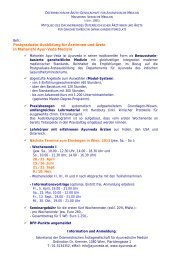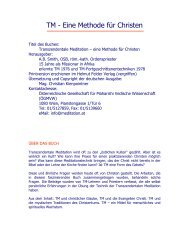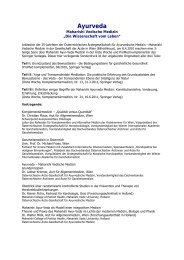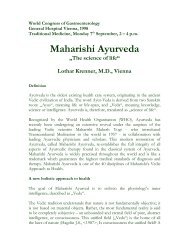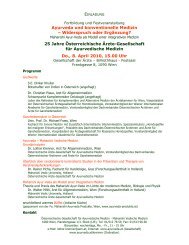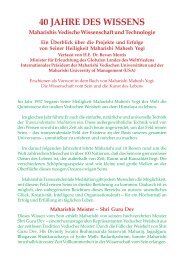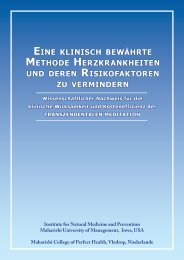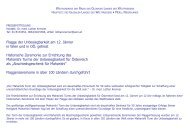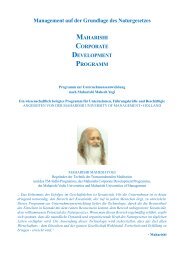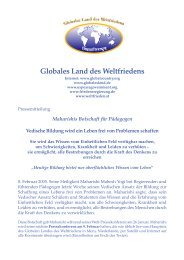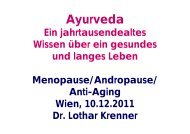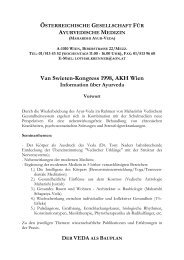Summary of Research Findings
Summary of Research Findings
Summary of Research Findings
You also want an ePaper? Increase the reach of your titles
YUMPU automatically turns print PDFs into web optimized ePapers that Google loves.
<strong>Research</strong> on the Maharishi Rejuvenation SM Program (continued)<br />
3. Title<br />
Health Promotion With a Traditional System <strong>of</strong> Natural Health Care: Maharishi Ayur-Veda<br />
Publication<br />
Journal <strong>of</strong> Social Behavior and Personality, Vol. 5, No. 3, pp. 1-27, 1990.<br />
Authors<br />
Robert H. Schneider,* Kenneth L. Cavanaugh,** H.S. Kasture,† Stuart Rothenberg,†† Richard Averbach,††<br />
Donald Robinson,* and Robert Keith Wallace.*<br />
Conducted at<br />
**Department <strong>of</strong> Physiological and Biological Sciences, Maharishi International University,<br />
Fairfield, IA 52556<br />
**Department <strong>of</strong> Management and Public Affairs, Maharishi International University, Fairfield, IA 52556<br />
††MAH Government Ayurveda Hospital, Ahmedabad, Gujarat, India<br />
††Institute for Ayurvedic Studies, Maharishi International University, Fairfield, IA 52556<br />
<strong>Summary</strong><br />
This study investigated the Maharishi Ayur-Veda Panchakarma § program and its effects on self-reported<br />
mental and physical health. This program includes a set <strong>of</strong> physiological therapies that are recommended on<br />
a periodic basis for enhancement <strong>of</strong> physiological homeostasis and promotion <strong>of</strong> mental and physical health.<br />
In a first pilot study, 142 subjects were surveyed after a 1-2 week Maharishi Ayur-Veda Panchakarma program<br />
for changes in health symptoms compared to 60 control subjects who participated in a didactic class for the<br />
same period <strong>of</strong> time. In the second follow-up study, 62 consecutive subjects were tested before and after a<br />
similar Maharishi Ayur-Veda Panchakarma program with the Pr<strong>of</strong>ile <strong>of</strong> Mood States (POMS) and compared to<br />
71 controls participating in a didactic class. The results for the pilot study showed that the experimental subjects<br />
reported significantly greater improvements in well-being, energy-vitality, strength-stamina, appetite and<br />
digestive patterns, previous complaints generally, and rejuvenation and youthfulness than control subjects<br />
(p=0.05 to



